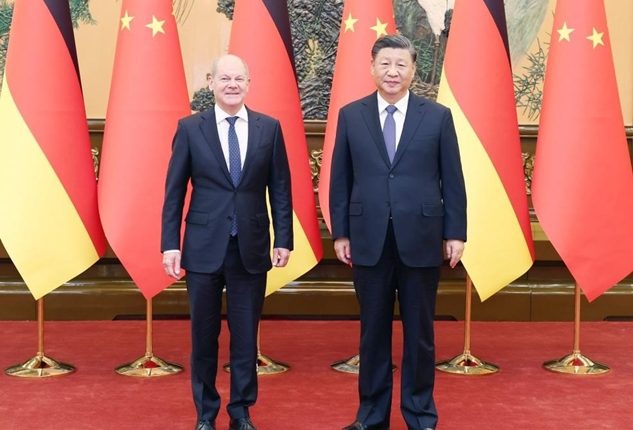Xi calls on Scholz for “positive China policy” as German Chancellor comes to Beijing amid pressure to reduce dependence on China
Chinese President Xi Jinping on Friday called on Germany to follow a “positive China policy” during a meeting with the visiting German Chancellor Olaf Scholz who came with a delegation of major German companies showing a desire to continue to seek business cooperation with world’s second-largest economy. Scholz’s one-day trip – which is latest in the spate of visits by foreign leaders to China this week after the 20th party congress of the ruling party – comes amid a push by many German political parties and Western partners for a tougher approach to economic relations with China and to reduce Germany’s dependence on China.
Recently, there was a fierce debate in Germany over a bid by Chinese state shipping giant Cosco to buy a 35% stake in a terminal in Hamburg, the country’s busiest port. After harsh criticism for ignoring national security warnings, Scholz’s govt restricted the size of the investment to 24.9%. Reports said, the potential deal has raised concerns in Germany that closer ties with China will leave critical infrastructure exposed to political pressure from Beijing, and disproportionately benefit Chinese companies.
The German leader’s visit came two weeks after the Communist Party elected its new top leadership following its 20th National Congress last month where President Xi has reelected the general secretary of the Central Committee flanked by a team of loyalists. According to a readout by Chinese Foreign Ministry, President Xi underscored the need for both countries to work together amid a complex and fluid international landscape. He said that Germany should not be influenced by “bloc confrontations” and “attempts to see everything through the prism of ideology”. China always regards Europe as a comprehensive strategic partner, and supports the European Union’s strategic autonomy, Xi said, adding that China will work with Germany for a future-oriented all-around strategic partnership and for new progress in China-Germany and China-Europe relations.
Scholz is the first leader of a G-7 country to visit China in nearly three years since the beginning of the Covid-19 pandemic at a time when German economy is facing a looming threat of recession have suffered the brunt of Europe’s energy crisis. Scholz said he hoped to “further develop” economic cooperation. Speaking at a press conference with Premier Li, Scholz said that Germany’s economic relationship with China had recently become “more difficult” because Beijing was making access to some of its markets more difficult. Germany is the greatest single contributor of European foreign direct investment (FDI) in China. Germany has made up 43% of the total European FDI on average, far more than the next three biggest sources of investment — the Netherlands, the U.K., and France. However, The biggest challenge for German businesses remains China’s zero-Covid policy which heavily impacts China’s attractiveness as a destination for foreign direct investment.
Before beginning his trip to Beijing, Scholz published a commentary in the German newspaper Frankfurter Allgemeine Zeitung, saying that “China is and will remain an important partner.”
“We will seek cooperation where it lies in our mutual interest, but we will not ignore controversies … When I travel to Beijing as German chancellor, I do so also as a European,” he wrote.
The two leaders also exchanged views on the situation in Ukraine, and expressed opposition to the use of nuclear weapons, with Xi supporting efforts by Germany and Europe to resolve the crisis. Scholz also mentioned areas of disagreement. German media reported that two leaders also discussed Xinjiang and Taiwan, where Scholz reaffirmed its support for the “one-China” policy but added that any change to the status quo must be peaceful and consensual.


Comments are closed.